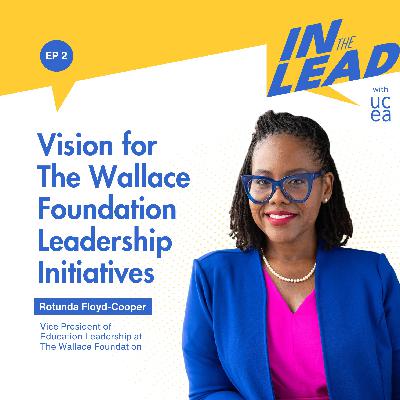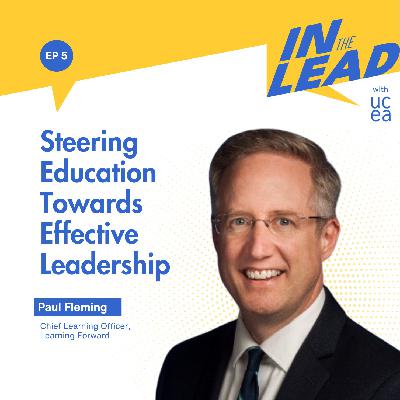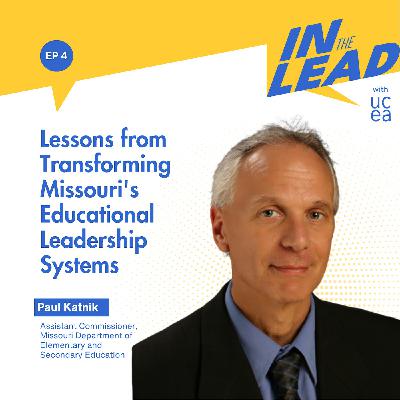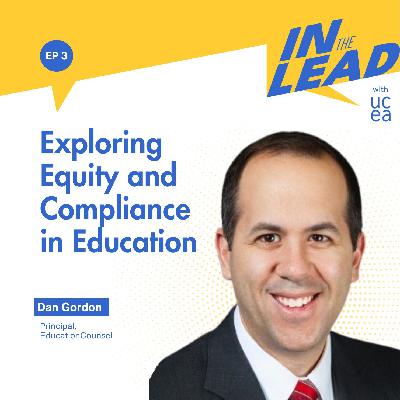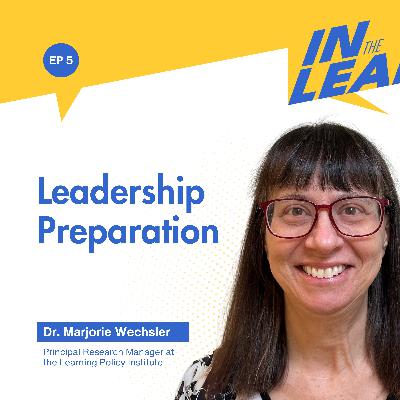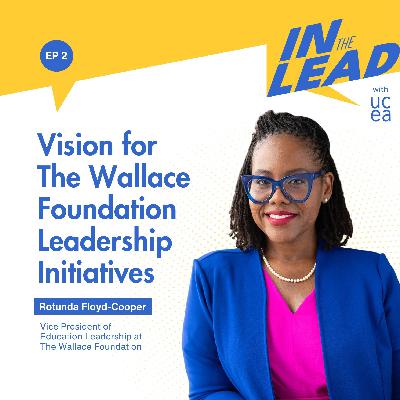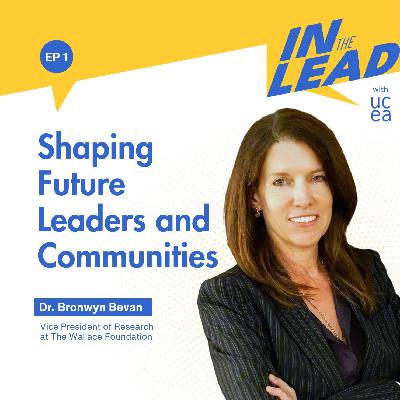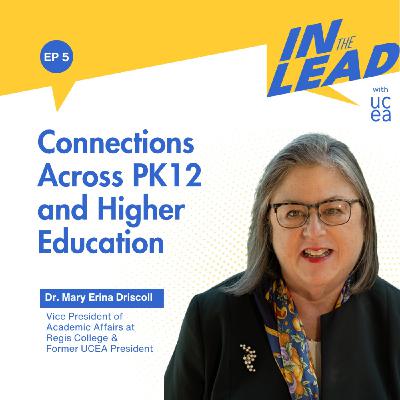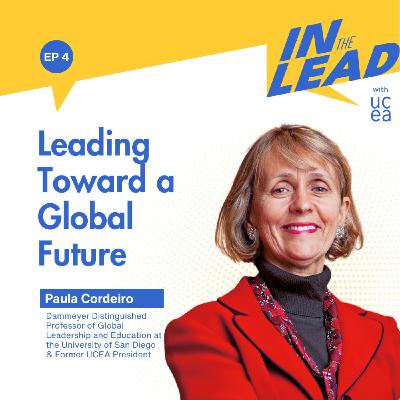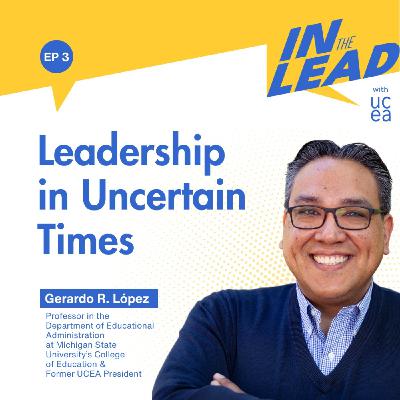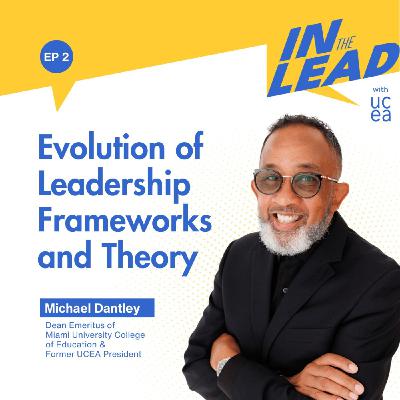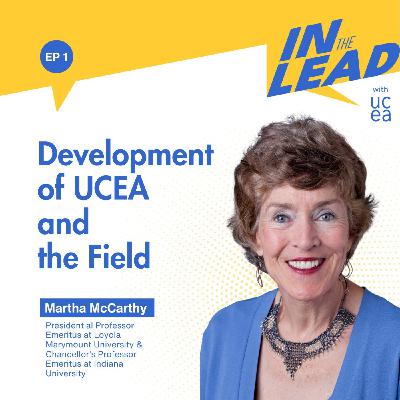Discover In the Lead with UCEA
In the Lead with UCEA

In the Lead with UCEA
Author: UCEA
Subscribed: 0Played: 0Subscribe
Share
© All rights reserved.
Description
UCEA presents pivotal conversations with people making an impact on educational leadership preparation, practice, and policy. Learn about the latest happenings and cutting-edge research from UCEA’s community of scholars.
27 Episodes
Reverse
Welcome back for season 5! In this episode of In the Lead with UCEA, Executive Director Dr. Mónica Byrne-Jiménez talks with Dr. Juan Manuel Niño, Professor of Educational Leadership and Policy Studies at UT San Antonio, where his research focusing on school district leadership, leadership preparation for social justice, latino leadership, and intersectionalities.Mónica and Juan explore the history and development of the Urban School Leaders Collaborative (USLC) program, which began in 2003. The program focuses on equity-centered leadership and has expanded from a master’s degree program to include a Ph.D., with pathways now for both principals and superintendents. Juan illustrates the impact of the collaborative efforts between UT San Antonio and SAISD, highlighting the Equity Centered Pipeline Initiative (ECPI) supported by the Wallace Foundation. Their discussion covers the importance of sustainable leadership and the intentional collaboration between university faculty and district leaders. Listen in for insights into the challenges and strategies for creating a lasting and impactful leadership pipeline in education.In the Lead with UCEA is produced by University FM.Episode Quotes:Building leadership pipelines rooted in community [03:07] The story for the program here at UT San Antonio began in 2003 with the efforts of Dr. Encarnacion Garza and, at that time, Dean Betty Merchant, who wanted to build a sustainable, grow-your-own model within the community of San Antonio. So at that time, they worked with San Antonio ISD and the superintendents to build and to develop a program that would be specific to the needs of the community and to the students and the population of San Antonio ISD. And then hence, that's why they developed the Urban School Leaders Collaborative in 2003.Juan discusses the role of the university in sustaining the equity pipeline.[16:19] I just feel that there's so much richness and tradition in this model, in this program. And [one of the] many things that I've learned is the whole notion of being intentional. Being intentional and transparent and authentic to make sure that this framework is understood and that it's not only respected but that it's really embraced as an opportunity for many school practitioners to look at their practice very differently.The collaborative efforts between UT San Antonio and SAISD’s equity-focused partnership[12:09] We are very proud that the USLC has always been incorporating clinical faculty into our leadership preparation at the master's level. So we always would invite graduates from our program to come and co-teach with us. However, due to budget and funding, sometimes it would be myself co-teaching another class with another graduate. It never was that we had a co-facilitation. Now because of the ECPI and the opportunities that have been afforded through this initiative, we have been able to be more intentional in that approach, meaning that all our coursework through the master's and the PhD, we have a co-teaching model. How that works is that every night when the cohort comes for class, they have two professors. One which is a tenured line professor from UT San Antonio from the department. And then we have the other one, who is a district member, whether at the campus level or at the district level, who is also co-teaching with that UTSA professor. So it has really helped us to develop a preparation that is aligned to meeting the needs and many times the initiatives that the district has set for.Investing with intentionality: building authentic relationships rooted in communityDr. Mónica Byrne-Jiménez [27:53]: Part of the sustainability discussion is always about structures and processes, and maybe, actually, sustainability is about people and relationships. And so how do you continue to grow and deepen relationships around a broader network of people, both at the university and [on] the district side?Dr. Juan Manuel Niño [28:51]: The process sometimes in the universities are not as predictable as I would wish we would have, right? And say, as [for] the funding and all of those aspects, I'm like, you know, creating a cadre of clinical faculty with an equity-centered mindset and becoming very, very familiar with a theory of action, to me, speaks of a sustainable model because we still have to invest and hire clinical model adjunct professors to come and help us teach. Why not invest with intentionality on building relationships with faculty members that are sitting in school districts and cultivating a cohort that will support this initiative? And that's what I've been doing since ECPI. And I think that's one of the biggest strengths that ECPI has afforded the USLC is to take not only the ownership of USLC in the department, but also sharing that ownership with district leaders throughout San Antonio.Show Links:Faculty Profile | UT San AntonioProfile | Journal of Research in Rural EducationJuan’s Research Page | ResearchGateECPI | Wallace Foundation
Today, we re-share a Season 3 episode that ties in perfectly to our upcoming season. We selected this episode because in it, Dr. Rotunda Floyd-Cooper provides a great overview of the pivotal work happening through The Wallace Foundation’s Equity Centered Pipeline Initiative (ECPI). We think this episode is the perfect introduction to our Season 5 conversations with some of ECPI’s district and university partners. Enjoy!In this episode of In the Lead with UCEA, Executive Director Dr. Mónica Byrne-Jiménez talks with Dr. Rotunda Floyd-Cooper, Vice President of Education Leadership at The Wallace Foundation, about ECPI, which aims to develop equity-oriented school principals across eight diverse school districts in the U.S. The discussion explores the initiative's impact on educational leadership and practices, the critical role of community and university partnerships, and the unique, context-specific approaches to defining and implementing equity in education. Rotunda also shares insights into the continuous improvement processes and upcoming research findings that are expected in the future.In the Lead with UCEA is produced by University FM.Episode Quotes:How ECPI districts and their university partners ensure high-quality, equity-centered principal preparation programs.12:36: [Mónica Byrne-Jiménez] How are the ECPI districts working with their university partners to make sure that their principal preparation is high-quality, equity-centered, and, sort of, building on strengths of the community?12:52: [Rotunda Floyd-Cooper] Yeah, that’s a great question. What's been fantastic to see in these partnerships with districts and these institutions of higher education is, just as we know that the districts want pools of principal candidates who are well-prepared to meet the real-world demands of the role. We also know that the university partners strive to offer the highest quality and most relevant principal preparation programs to attract candidates and to meet the needs of the districts that they serve. That's the reason that the partnerships between the universities and the local school communities are so essential. Each district is either developing or revising leader standards and then working closely with their university partners to ensure that those standards will guide the pre-service work and preparation that the university partner offers. And in some cases, for example, in Columbus City Schools, in partnership with the Ohio State University, there's even collaboration on the development and support of in-service principals. These partnerships, in some cases, even result in more strategic approaches to preparation for assistant principals within the district.The Wallace Foundation recognizes each district’s unique definition of equity.07:59: [Rotunda Floyd-Cooper] While we do, at Wallace, think about equity in a very specific way, The Wallace Foundation is not imposing a singular definition of equity on the districts that we are partnering with. Each district has actually defined its own vision for equity with input from the community. And they are designing their pipelines with the vision for equity embedded that they have collaborated with their communities around. And what's really exciting about the work is that, in partnership with the stakeholders that I mentioned previously, they are iterating on what they learn over time about the needs of principals, along with the interests of their communities, and they leverage the deep knowledge of some of the other partners, like state agencies, as well as members of higher ed communities, to engage in this continuous improvement process.08:51: [Mónica Byrne-Jiménez] And just hearing you say that now also makes me think that, actually, part of the approach, if that's the right word of the foundation, is to recognize that issues of equity have to be locally driven. And so, that's actually part of the equity definition, right? It's not something that can't be imposed, but rather locally driven, locally addressed in local leadership.[Rotunda Floyd-Cooper] Yeah. I think that's a fantastic point.Rotunda shares insights and hopes for sustaining Wallace leadership initiatives19:10 Through a series of independent research studies, we're hoping to learn whether large districts, in partnership with all of the stakeholders that we've spent this time talking about, can create principal pipelines that are capable of producing and supporting leaders who can advance equity within their districts. We're also hoping, though, to be able to understand how local history and district culture shape approaches to equity. And more specifically, the researchers who are engaged in this component of a study will be able to document the cultural, historical, and organizational factors that district partnership teams have to grapple with as they develop visions, goals, and plans for equity-centered principal pipelines.Show Links:Recommended Resources:Equity-Centered Pipeline Initiative (ECPI)Guest Profile:Wallace Foundation ProfileLinkedIn
Welcome back to Season 5 of In the Lead with UCEA!
In this episode of In the Lead with UCEA, Executive Director Dr. Mónica Byrne-Jiménez talks with Paul Fleming, Chief Learning Officer at Learning Forward, where he works with states and districts to increase educator and leader effectiveness through student-focused, high-quality, professional learning.Mónica and Paul discuss Learning Forward's international outreach, including their popular annual conference and strong membership base. Paul emphasizes the importance of cohesive principal pipelines and the educator lifecycle and also the significance of professional learning standards, their development process, and their adoption by states. Paul explains why aligning high-quality professional learning practices across educational systems and the critical partnerships between state agencies and higher education is necessary. In the Lead with UCEA is produced by University FM.Episode Quotes:The danger of not having a cohesive and comprehensive set of professional learning standards[08:46] We see this a lot, and I'm sure you do too, both in the higher ed space and in the K12 space, is that what we really want to keep doing is trying to help increase the pockets of excellence that are there, right? And we know that there's a lot of pockets of excellence that schools, systems, and higher ed institutions engage in. But without that kind of cohesive and comprehensive set of standards, the danger is then you have a lack of common language. You have silos happening in a way that perpetuates, sometimes, inequities. It perpetuates practices that are not always evidence-based. And so just the fact of having that kind of anchor, and we often call our standards, kind of, like, the anchor document, right? And instead of [a] roadmap, [it] provides a real, I think, sense of clarity for how to align then practices. Why it’s no longer an option but a necessity to build a collaborative leadership space[13:09] We know the challenges right now of retaining high-quality teachers and principals. And so it's interesting that while educator pay is important, it's often the perception of the leader in the principal seat number one. Then the culture of collaboration support that's going to build into [it], so I think I am fortunate that I get to do some of that work with systems too, to help build their leadership team capacity. Because that's the other thing we're seeing is [that] the principal job has become, not to sound too informal, but ginormous, right? Like how large right now the principal role [is] and how many hats they wear. And I think that's another reason why it's no longer an option but a necessity to build a culture of collaborative inquiry and a culture of collaboration as a leader. Because if you think about the history of, like, operational leader, you know, books, boilers, and buses, that principals started with, to kind of, sole instruction leader and what that meant. And now it's really important to build a collaborative leadership space.On bringing leaders together across systems through the Leadership Team Institute[14:09] Monica: I think in some ways, particularly around the principal role, it also breaks down the sense of isolation that can be really overwhelming in schools, and particularly, like you said, as we continue to make roles more complex. And then, in addition, sort of, the context is becoming more complex.[14:27] Paul: Yeah. And I think that's the other important piece that you touched upon that I think is a lever for state agencies, and that is as an agency that has the power to convene. Leaders coming together because of what you just said—the isolation, the sometimes silos and challenges, and how often, and we have several networks that we lead and run, including one that I help lead called the Leadership Team Institute that brings leaders together across systems for that very purpose, right? To convene and to help spread and share both practices and challenges.Show Links:LearningForward.orgProfile | Learning ForwardLinkedIn ProfileSocial Profile on X
In this episode of In the Lead with UCEA, Executive Director Dr. Mónica Byrne-Jiménez talks with Paul Katnik, Assistant Commissioner at Missouri Department of Elementary and Secondary Education, where he has been instrumental in coordinating the state model educator evaluation system.Mónica and Paul discuss Paul’s role in the development and implementation of the Missouri Leadership Development System (MLDS) and the Missouri Teacher Development System (MTDS). Paul emphasizes the importance of a systemic approach to educator preparation, certification, and development, highlighting significant strides in teacher recruitment and retention. Paul also brings up the various challenges and successes of fostering statewide partnerships, using data to drive improvement, and continuously adapting to changing educational landscapes. In the Lead with UCEA is produced by University FM.Episode Quotes:The challenges that came with creating a leadership system.[12:26] We have to keep reminding ourselves that for the user, for the principal, trying to navigate their way through a career in school leadership, they only know what they do and they interact with all these partners, and if we all come at them with different agendas and different language, it just makes it harder for them. And so we try to meld those together as much as we can while still honoring the integrity of all those partners and what they bring to the whole thing. And so the relationships have certainly been a challenging part of this. Data proves the lasting impact of MLDS on school leadership.[19:04] Data says that our MLDS principals have retention rates 10 percentage points higher than the state's average and has for every year that it's been in full implementation. 20 percentage points higher than if you're a non-MLDS principal. That data tells me that we're doing something right in terms of [the] longevity of school leadership. As a part of our annual evaluations, we have interviewed teachers. We've interviewed superintendents. And to me, it's important to not only ask the user, "Is this valuable?" but then to ask the people who surround them to say, "Do you see the impact of MLDS on their leadership?" and to have 80 to 90% of teachers say, "Absolutely, I can see a different change in practice that they learn. They bring things that they've learned into our school that supports me, helps me be a better teacher, and, in fact, helps my students learn at higher levels." That tells me something when superintendents say, "I can see my principal turning into a better instructional leader.Was blended funding the right call for MLDS?[20:56] We've always attempted to do blended funding because we didn't want the loss of any one source to be the end of all of this work. And at times, like now, that maybe has been a good plan of attack to kind of do it that way. But every piece of funding then comes again with its own limitations and its own uses and whatever, and you have to navigate all of that too. But we've managed to put together, kind of, a blended funding thing. When we first started getting our funding together, we went to the 3% that was allowed through the new national education law, and we did the math, and we picked out about 40 superintendents in the state who would be losing a bigger share of their Title II A funds if we did the 3% set aside. And we went and visited them. And so I sat in the office with a bunch of superintendents, and I said, "If we move ahead with creating this system and we use these funds for that, your district is going to lose this much money, and I want to hear your opinion of that." And every superintendent we talked to said, "Go ahead and do it, but do it right."Show Links:MLDS | Missouri Leadership Development SystemThe Educator Growth ToolboxProfile on LinkedInSocial Profile on X
In this episode of In the Lead with UCEA, Executive Director Dr. Mónica Byrne-Jiménez talks with Dan Gordon, principal at EducationCounsel where he leads a variety of K-12 projects focused on advancing learning system approaches and supporting school districts to expand opportunities and accelerate improved outcomes for all students. Mónica and Dan discuss the evolving role of federal involvement in education under the current administration, including themes of reducing federal influence and focusing on leveraging the remaining capacities to advance specific priorities. Their conversation touches on challenges such as preemptive compliance and the importance of separating significant policy changes from media noise. Dan also highlights opportunities for institutions to rethink and recommit to Diversity, Equity, and Inclusion initiatives amid policy shifts. The conversation ends on the optimistic point of the power of coalition building and sustained partnerships to protect and advance educational values.In the Lead with UCEA is produced by University FM.Episode Quotes:What is EducationCounsel and what work does it do?[02:29] We're a mission-driven education consulting firm. We do early childhood and K-12 and higher ed. My focus tends to be more on the K-12, just given my background. And we do a lot of things. We do some strategy work. We do a lot of connecting of dots and bringing folks together.Dan Gordon shares their biggest concern with misinterpreted signals and noise and its implications.[09:53] We worry a lot about what we call preemptive compliance, and I think the biggest risk of the signal and, like, confusing the signal for the noise or not finding the signal in the noise is that the noise is scary and all encompassing and really dramatic. And the concern is that folks, because they're not able to or are struggling to find that signal, instead listen to the noise and it drives them to comply, to change things, to comply with what they think or are being told what the law is, or that the law has suddenly changed to be. And they're complying not when they're forced to because there's been an investigation and/or a court case or something that is really sort of called the question, and instead they're preemptively complying in advance.Going beyond the headline is key to understanding the right time to comply.[16:18] If you're not someone who's familiar with the way litigation unfolds, you might see a headline that says, Courts find illegal this thing or courts find legal this thing. And the truth is that a lot of those are early decisions, temporary decisions, preliminary decisions that don't get to the point of a final say about whether something was legal or illegal. And so it's the other way, is that, you know, you also have to make sure that institutional leaders don't see, oh wow, this court temporarily put a hold on this thing, so therefore, you know, it's illegal and I don't have to pay attention to it. Well, and they may have just temporarily done it for the next couple [of] days while they considered full arguments about it. Or maybe they changed it only for the people in that one place in Vermont. And that doesn't apply to us too. So, it goes both ways in terms of whether it's news that you find good because of where you stand or news that you find troubling because of where you stand. It's really important to kind of go behind the headline. Show Links:Education Counsel | ResourcesEducation Counsel | Executive Actions ChartEducation Counsel ProfileLinkedIn ProfileSocial Profile on BlueSkySocial Profile on X
In this episode of In the Lead with UCEA, Executive Director Dr. Mónica Byrne-Jiménez talks with Zeke Perez, Assistant Policy Director at the Education Commission of the States (ECS). Zeke tracks legislation related to statewide longitudinal data systems, school safety, and post-secondary campus safety. He's also done recent comparisons of state strategies to support the preparation and development of high-quality school leaders.Mónica and Zeke discuss the importance of connecting different role groups and states to share information and best practices in education. They highlight the cyclical nature of educational challenges from past decades, and their conversation emphasizes the need for collaboration and innovation among and across states to address persistent issues more effectively. Tune in to hear how ECS supports leaders in its ‘weaver’ role.In the Lead with UCEA is produced by University FM.Episode Quotes:Zeke discusses some of the most important state & local context factors that shape the work that he does with state policy makers. [06:42] We work on every issue under the sun, really. But recently, our steering committee came together and brainstormed a few policy priority areas that we'll be unveiling and working on more as the year goes on. But yeah, so we will primarily focus on those areas and see where we can proactively help states beyond that, you know, we're reacting to state needs, and like you said, the varying state contexts really impact how we're talking to any given state, right? We know that Wyoming maybe cares more about South Dakota or Montana than it does New York or California. You know, we just know that the different levels of funding, the different student populations, the different spread of schools across the state from urban to rural. We know that it all impacts what a state's looking for. And so while we won't advocate for any specific policy or tell states what to do, we'll connect them with other states that have the same populations, have the same type of funding challenges or opportunities, states that are working on the same issues, and we'll try to connect them so that they can work with like states to share the best information and share the approaches that they're all taking and learning from.Recurring challenges emerging across states.[11:10] I think one challenge consistent across states is the lack of experience that we've seen in those leadership roles. So, we've seen a study that shows that over 40% of principals working in their current schools have been there for three or fewer years. Right, and so, I think these pipelines help get individuals into school leadership positions earlier so that they can stay there longer and build that experience. But I think another way that we've seen states approach that is providing a lot more professional development and supporting teachers, regardless of experience or the type of school that we're in. I think we've seen that across a few different buckets. We've seen states tackle that broadly. So, for instance, Alabama developedtheir principal leadership development system that provides professional development and other supports to principals in their systems, just generally. We've also seen states look at a more targeted approach for schools and then a targeted approach for subjects. [12:23] So again, just a broad spectrum of how states are providing support to school leaders.How ECS is weaving connections to make impactful changes[22:54] One of the areas where we hope to weave states is, you know, they're each working on these different issues and making progress in their own ways and innovating in their own ways, but finding the opportunity to help them find those best practices and work across states and continue to build towards solving these problems that have been on their plates for a short time or for decades. Just making sure that they can connect and grow and shape the best policy possible.Show Links:In the Lead with UCEA with Mary Erina Driscoll Education Commission of the States Profile LinkedIn Profile
In this episode of In the Lead with UCEA, Executive Director Dr. Mónica Byrne-Jiménez talks with Paul Manna, Isabelle and Jerome E. Hyman Distinguished University Professor of Government at William & Mary. Mónica and Paul discuss Paul’s career focused on K-12 education, federalism, and policy reform. Paul shares his insights on how states act as educational policy actors and his recent work with the Wallace Foundation to support the preparation and development of high-quality principals. Their conversation also delves into the impact of state-level policies, the importance of leadership within education, and how educational institutions can better collaborate for effective policy implementation.In the Lead with UCEA is produced by University FM.Episode Quotes:Engaging elected officials in conversations about supporting education leaders.[05:41] The good news from the education policy [and] education leadership field is there's a lot of evidence that great principals also make differences in schools and in school districts and in the lives of children. And so, obviously, military leaders and business leaders, their jobs aren't identical to what principals do. There's differences. There's important differences, but some of these broad principles of leadership do cut across these arenas, and so I think having conversations with elected officials that remind them about those other contexts where there's parallels that's, in a way, could be a door opener for them to understand the import of this and why it's worth it to train up people and support people who are leading schools, just like we would want to have great people leading businesses, large or small, or leading troops, or whatever it might be. We need great people leading in schools.Politicians sometimes gloss over the nuanced differences that exist within educational leadership.[09:28] I think even within education there could be a better appreciation for the varieties of leadership roles that there are in education, right. And I think state standards in some place, like, they've started to come around to this that it's not necessarily a great idea to just have general standards for leaders because the principal of the school has a different kind of job than the superintendent of the district, right? Or some other leader, like within a school, a teacher who's maybe a department head within a certain program area, or a leader who leads the assessment, part of a district role, or the nutrition part. Like, these are different roles. And so I think having an appreciation for that difference is important. And sometimes politicians, kind of, gloss over that, because they just think leadership is all the same, you know? But to your point, like, it isn't necessarily, and so helping them understand that maybe what you're expecting out of an assistant principal for licensing doesn't necessarily need to be the same thing as what you would expect out of a principal. And you'd want something even different or more for a superintendent, let's say.Good policy entrepreneurs know how to communicate with policy makers.[21:15] If you really have an interest in policy and getting involved in conversations to shape policy, then you should have some element of your work that gets your nose into the weeds of how policy is actually carried out. [21:24] Sometimes the worst impulse of faculty, and everybody's fallen prey to this at some point in their career, is that we think we've got these great ideas and these great answers, and then we show up in a room and we're speaking a language that nobody understands. Show Links:Developing Excellent School Principals to Advance Teaching and Learning Considerations for State PolicyFaculty Profile | William & MaryLinkedIn ProfilePaul Manna’s Home PageDemocracy in Five Minutes PodcastGoogle Scholar PageWallace Foundation ReportsSocial Profile on XSocial Profile on Bluesky
In the Lead with UCEA brings you pivotal conversations with people making an impact on educational leadership preparation, practice, and policy. We're back with season four of In the Lead with UCEA.This season, we will be talking with leaders from some professional organizations and UCEA partners who develop, track, and advocate for educational policy work at the state and national levels. We also learn how we can focus our efforts at the state level to advocate collectively for educational leaders, school communities, and children. Hear from our exciting lineup of guests about how their organizations are working to improve educational leadership across states and contexts. Join our conversation. Tune into the first episodes releasing soon and check out our past episodes. Subscribe to In the Lead with UCEA wherever you listen to podcasts.
In this episode of In the Lead with UCEA, Executive Director Dr. Mónica Byrne-Jiménez talks with Dr. Mark Anthony Gooden, Christian A. Johnson Endeavor Professor of Education Leadership, Teachers College, Columbia University, about the report he was lead author on, ‘A Culturally Responsive School Leadership Approach to Developing Equity-Centered Principals.’ and culturally responsive school leadership. Mark explores the origins, development, and impact of his report focused on anti-racist leadership and equitable educational environments.Mónica and Mark discuss critical consciousness, inclusive pedagogy, and the importance of principal preparation programs, underscoring the necessity of continuous, collaborative partnerships between universities and school districts. Mark shares how Dallas and Houston ISDs demonstrate the benefits of such partnerships, emphasizing leadership supervision, instructional leadership, and pre-service principal preparation. They also address systemic issues, such as transportation inequities affecting Latinx students, advocating for consistent equity-oriented practices and vigilant support for educational leaders at all levels.Submit your takeaways and/or questions here: forms.gle/qFEL3BMUfJnBdMoP9 In the Lead with UCEA is produced by University FM.Episode Quotes:Having critical consciousness is having an understanding of historical oppression[08:44] I tend to think about starting this conversation around an interrogation of race, because it is so interwoven into our systems, it's interwoven into our personal ways, our personal mental models or personal paradigms, but also, in our systems paradigms or our collective paradigms. So, we have to start with that critical consciousness of the leader. Like, how do they think about these systems? Do they think about these multiple levels in terms of oppression? And then, if they do, then certainly, they're going to be looking at the school systems, for instance, moving right into instructional leadership. How do they, not necessarily go around and work with their teachers and say, “I'm going to show you how to be culturally responsive,” but we would think that, with a critical consciousness lens, they can go into a classroom and see if there are inequities happening, or if there are students who are not getting access to a curriculum that represents them, if there's a curriculum that doesn't present them in a favorable light, for instance, or at all. So often, right now, we're seeing more with things like the 1619 curriculum coming out on board over the last few years, but so often, complete cultures have been left out. Or oftentimes, they haven't been left out, they’ve been misrepresented.They've been flattened, and so that they're one-dimensional. And so we said, it needs to be that they're supporting cultural-responsive pedagogy. That was very, very important.The necessity of rich research-practice partnerships to strengthen the comprehensive, aligned principal pipelines. [16:01] Some of the districts around the country have started to embrace these research-practice partnerships, right? And when we think about that, Wallace started to strongly encourage these conversations between university prep programs and districts. So, we now can theorize forward a little bit more about equity is in there, and it's, sort of, woven in between, and those folks who are hiring and selecting principals, school districts, are now looking back and saying to the university prep program, “Yes, we want the equity piece. We want to know how you're doing it,” but then I'll go a step further and say, the people that I started with, the supervisors of those principals, now have a, kind of, three-way conversation and a piece there that we can get excited about because it's more connected, it's fertile ground for, really, creating a rich research-practice partnership. And it's also something that we can have equity really nicely interwoven throughout. So, that was something that we were excited about. I mean, we didn't articulate that as well as I've just said, because obviously, I've had a couple of years since, but, obviously, one of the things that we were saying really pushed that thought directly forward to say, this is what should be in there and this is how we should be thinking about it.Is there a leveraging point to impact the whole pipeline?[22:32] I think high-quality principal preparation seems to be the biggest one if it is tightly connected to the other ones. I think we have to move away from that independent thing, because I think if you have high-quality principal preparation and you have a weak set of standards, it's going to be hard for our colleagues who are less comfortable doing this work to look at standards and see how can I be more equity-focused? It doesn't even say that in the standards, right? And even if it does, it's still like, “That's probably not speaking to me.” So, it has to be tightly connected. Show Links:A Culturally Responsive School Leadership Approach to Developing Equity-Centered PrincipalsGuest Profile:GoodenPhD.comFaculty Profile at Teachers College, Columbia UniversityLinkedIn ProfileSocial Profile on X
In this episode of In the Lead with UCEA, Executive Director Dr. Mónica Byrne-Jiménez talks with Dr. Marjorie Wechsler, the Principal Research Manager at the Learning Policy Institute, about the report she was co-author on, ‘Developing Effective Principals: What Kind of Learning Matters?,’ and the importance of high-quality learning for principal preparation and professional development. With over 30 years of experience in policy research, Marjorie details the genesis and key findings of a report sponsored by the Wallace Foundation that explores features of effective principal preparation, access to learning opportunities, and the role of policy at the state and local levels. Marjorie emphasizes the importance of applied learning, mentorship, and district partnerships in shaping competent school leaders who can drive student success.Submit your takeaways and/or questions here: forms.gle/qFEL3BMUfJnBdMoP9 In the Lead with UCEA is produced by University FM.Episode Quotes:Having cohorts and networks can reduce the isolation that many principals face.[12:06] Being a principal is not an easy job. Having someone to say, “You've got this. Yes, you struggled on that, but look at how well you did on that.” And just providing alternative perspectives. In the same way that mentors and experts are important, so is just having a cohort of other principals. Being in a cohort and in a principal preparation program or having a network of principals can really help principal learning, having professionals learn and grow together. Having a space to ask questions, admit challenges, learn from others who might have been through whatever it is that you're facing, [and] try out ideas, and also, cohorts. Particularly, for practicing principals, cohorts and networks can reduce that isolation that many principals may face.Why having a good relationship between preparation programs and the district is very important.[14:39] Dr. Mónica Byrne-Jiménez: In order to have authentic experiences in a preparation program, you have to have an authentic relationship with the district. And it needs to be in alignment in what is a high-quality learning opportunity, as well as what is high-quality practice. And so, it makes a lot of sense that you have to align the program, the relationships, and the opportunities in order for aspiring principals to go through a really enriching experience. I think that's really important. And I think, as a result of that, we saw a lot more district partnerships, some district preparation research, partnerships with districts. But the heightened need and understanding of and to use your language, we're still in the same ecosystem here, right? So, we need to be in communication with each other.[15:26] Marjorie Wechsler : Yeah. Absolutely. And also, having those strong relationships allows the districts to know that the principals who are coming out of these programs understand the district and it allows them to say, “Hey, this is really important. Here are our students. And we have found that our most successful principals know these areas very well.” So, both the district and the programs share an investment, a motivation for developing these principles as well as they can be developed.Marjorie talks about some of the recommendations coming out of the research[22:53]: Having paid internships or residencies can open up really good learning opportunitiesfor some of the most promising candidates, and not just those who can afford a program. This is just one of several examples, but North Carolina has a state Principal Fellows Program, which provides scholarships to individuals who are looking to get their master's degree in school administration and work as a North Carolina public schools. The first year, they get a stipend, which pays for tuition and books and living expenses while they can study full time. And then the second year, they receive the salary of a first-year assistant principal, as well as an educational stipend, so they can do that full-year internship, they can afford it, working under the mentorship of a veteran principal. And in return, they work four years in a North Carolina public school. So it's win-win: high-quality preparation, and then the public schools have this well-developed principal.Show Links:Recommended Resources:Developing Effective Principals: What Kind of Learning Matters?Guest Profile:Profile at Learning Policy Institute
In this episode of In the Lead with UCEA, Executive Director Dr. Mónica Byrne-Jiménez talks with Dr. Ellen Goldring, Patricia and Rodes Hart Professor of Educational Leadership in the Department of Leadership, Policy and Organizations and Vice Dean from Peabody College Of Education and Human Development at Vanderbilt University, about the report she was lead author on, ‘The Role of Assistant Principals Evidence and Insights for Advancing School Leadership,’ and in what ways the AP role could make more powerful contributions to educational equity, school improvement, and principal effectiveness. They discuss the increasing number of AP roles and the growing complexity of their roles in educational leadership. Ellen explores the shift from their traditional image as disciplinarian to their important roles in community building and leadership development. The discussion also delves into disparities in career advancement for assistant principals, particularly among educators of color and women, and underscores the importance of mentorship and equitable opportunities for leadership progression. Submit your takeaways and/or questions here: forms.gle/qFEL3BMUfJnBdMoP9 In the Lead with UCEA is produced by University FM.Episode Quotes:Data uncovers the dramatic increase of assistant principals, expanding sixfold compared to principals.I think the first thing that was just really, really surprising, and we had no idea using national data was the extent to which the number of APs has increased over time. I don't think anyone anticipated that, or certainly we didn't. So the first thing that we found is, Wow, this is a role that's being implemented in schools more and more, and in fact, we estimated that the APs have grown more than six times as fast as the number of principals, from 1990 up to 2015. Has the role of assistant principals changed over time?09:36 The literature review suggests that [the roles has] probably overemphasized that assistant principals do student discipline, because as we know, student discipline doesn't happen in a vacuum. And I think, in many ways, it is much more related to the instruction of the teacher and how the teacher is being mentored and supported to engage students in teaching and learning and how the students are being addressed in the classroom. So, separating out student discipline as separate from mentoring of teaching and coaching of teaching is a little problematic. One of the things we talk about a lot in the report is, how are we conceptualizing roles? And how do we think about roles when there's so much interconnection in practice? And we might want to think about this a little bit differently.The misalignment of feedback and evaluation for assistant principals.19:47 Most states evaluate assistant principals on the same rubric as principals, and how that's handled is very variable. Some districts say, “Well, if you're assistant principals, you can't be exemplary because that's only for principals.” So you're starting out and you get to a certain threshold. Others include the assistant principal in the principal's overall school evaluation. It depends on the rubric. And what is often the case, though, in both of these scenarios is how misaligned feedback and evaluation is for assistant principals to the work that they're actually doing. So, why am I bringing that up now? I think there's also very few states, and we talked about this in the report, that have differential licensing and differential certification processes. A few do. We have no research on whether these differential certification processes or licensees somehow bring a different outcome or more people into the profession or it's developmental approach. That's a whole area that needs work. But what I think is important is that we consider the unique roles and responsibilities that assistant principals do that are distinct from principals, and this gets into the pipeline work.Show Links:Recommended Resources:The Role of Assistant PrincipalsGuest Profile:Faculty Profile at Peabody College of Education and Human Development at Vanderbilt University
In this episode of In the Lead with UCEA, Executive Director Dr. Mónica Byrne-Jiménez talks with Dr. Jason Grissom, Patricia and Rodes Hart Professor of Public Policy and Education at Vanderbilt University's Peabody College and Faculty Director of the Tennessee Education Research Alliance, about the report he was lead author on, ‘How Principals Affect Students and Schools,’ a comprehensive synthesis of two decades of research commissioned by the Wallace Foundation. Jason discusses how his research underscores the significant impact of principals on student learning outcomes and educational equity. Their discussion also delves into the importance of an equity lens in school leadership, essential skills for principals, and the future directions for research in this field.Submit your takeaways and/or questions here: forms.gle/qFEL3BMUfJnBdMoP9 In the Lead with UCEA is produced by University FM.Episode Quotes:Four key behaviors of effective principals according to the research[05:09] We spent months and months culling through these studies and trying to come up with what were the studies that we could really lean on in terms of making that connection and what could we learn from them about. Those domains of behavior that seemed to be linked most clearly to better outcomes for kids. And so we identified four of those. And so we call those engaging and instructionally focused interactions with teachers, building a productive climate, facilitating collaboration and professional learning community, and managing personnel and resources strategically.The equity lens opens an opportunity for self-reflection[11:37] The equity lens idea is the idea that principals should be driving their schools towards more equitable outcomes for marginalized and non-marginalized students in their schools, which means that their work in these 4 domains of practice have to reflect that priority. And we liked the metaphor of the lens because it emphasizes a perspective on the broader work. So, as a principal, I'm working to build a productive climate for my building. But that means a productive climate for all kids, right? Regardless of background. So, how am I ensuring that students, regardless of who they are and what they come to school with and what their identity characteristics are and so forth, how are all of those kids experiencing those levels of trust and care and self efficacy, you know, those goals that I have for a productive climate? And so that's the lens idea. So I'm all kids in mind, climate is not just the typical kid or the average kid or the kid who I see the most often. It's a productive climate for kids regardless of their background.Leadership expectations are often set beyond realistic human capabilities.[16:20] I think a challenge we have in the field of educational leadership is that the standards that we set for what we expect of school leaders is very high. Sometimes I think we're expecting superhumans, not real humans. And if standards are aspirational, right? And some part of what you do when you write down a standard is you're giving a person something to aspire to. And I think that's important. I do think, though, that when you're having to train and prepare on so many different dimensions at once, that it can lead that preparation for the candidate even to feel unfocused. Like, there's so much I have to learn and I don't understand on what timeline I need each one of these things. And so, what I hope our results can do bring a little bit of focus to where we can start as we're trying to provide people with a set of skills and capacities that they need to enter leadership. And be as successful as they can be right at the beginning of the career.Show Links:Recommended ResourcesHow Principals Affect Students and SchoolsGuest Profile:JasonGrissom.comFaculty Profile at VanderbiltSocial Profile on XGoogle Scholar Page
In this episode of In the Lead with UCEA, Executive Director Dr. Mónica Byrne-Jiménez talks with Dr. Rotunda Floyd-Cooper, Vice President of Education Leadership at The Wallace Foundation, about The Wallace Foundation’s Equity Centered Pipeline Initiative (ECPI), which aims to develop equity-oriented school principals across eight diverse school districts in the U.S.
The discussion explores the initiative's impact on educational leadership and practices, the critical role of community and university partnerships, and the unique, context-specific approaches to defining and implementing equity in education. Rotunda also shares insights into the continuous improvement processes and upcoming research findings that are expected in the future.
Submit your takeaways and/or questions here: forms.gle/qFEL3BMUfJnBdMoP9
In the Lead with UCEA is produced by University FM.
In this episode of In the Lead with UCEA, Executive Director Dr. Mónica Byrne-Jiménez talks with Dr. Bronwyn Bevan, Vice President of Research at The Wallace Foundation, about the foundation's learning strategies and research initiatives. Dr. Bevan elaborates on the foundation's focus areas: educational leadership, youth development, and the arts, highlighting their long-term goals or 'North Stars' for each area.
She also shares insights into the foundation's current initiatives, such as developing equity-centered leaders in education and supporting arts organizations founded by communities of color. Mónica and Bronwyn explore the interconnectivity of these focus areas and the strategies adopted by the foundation to innovate and document impactful change. Bronwyn also reflects on her own professional background and how it has influenced her work at the foundation.
Submit your takeaways and/or questions here: forms.gle/qFEL3BMUfJnBdMoP9
In the Lead with UCEA is produced by University FM.
In this episode of In the Lead with UCEA, Executive Director Dr. Mónica Byrne-Jiménez talks with Dr. Mary Erina Driscoll, Vice President of Academic Affairs at Regis College, and president of UCEA from 1999-2000, about how her experiences in Catholic education and interactions with mentors shaped her dissertation on schools as communities. Mary provides a deep dive into UCEA's evolution from an exclusive club of doctoral institutions to an inclusive organization championing diversity and collaboration.Leadership in education is a complex dance of balancing resources, advocacy, and communication. Drawing from her extensive experience as a dean and provost, Mary offers invaluable insights into the dynamics of leadership and partnership within higher education and its interplay with K-12 education. This episode is packed with practical advice and reflections. Listen in and gain a deeper understanding of the challenges and rewards of educational leadership and policy, all while celebrating the rich history and ongoing impact of UCEA.In the Lead with UCEA is produced by University FM.Episode Quotes:Discussing the challenges within the higher educationWhen I went to City College, which is a great place, but, interesting in terms of the politics, and people would say to me, "Well, you're in leadership," and especially when I went into the provost position, "What books have you read?” And I said, "Wolf Hall." And the reason I said that is because Thomas Cromwell, who's a very difficult character in that, not anybody that you would want to necessarily emulate in terms of his particular values but one of the leadership behaviors he engages in is he looks at the people that he's working with, and he tries to figure out in a given situation what is it that they want, what is it that's important to them, not what would he want if he were in that situation. And it's amazing when you look at some leaders. They can't make that shift. And I think, as a dean of education, or as a professor that was working in partnership when I was at NYU, again, with my colleagues with districts, it was very important to say, "What's important to the people that I'm working with in K-12? What are they looking for out of this relationship? And what can we provide there, not what makes sense for us to do?" On being vocal about the value and importance of educationIt is important for our scholarly community to be vocal about the value and importance of education, period, and increasingly higher education. It's not just because it's our bread and butter. We, sort of, self-select into it because we like it or we see its value or whatever, but in most cases, it's an exceptional case where that's driven by, boy, this is a great economic place to be in. I mean, how many of our professors are teaching either master's students or doctoral students that are making two, three times their salaries as district administrators. They deserve it, but I think we have to talk about, so, what is it that this community allows us to do? What are the benefits, not just to us personally, but benefits that accrue in helping to elevate the scholar practitioner within that K-12 community? We don't do a great job of supporting people once they finish their degrees, right? We're, sort of, not set up to do that. When we're able to bring together policy makers, scholar practitioners, professors, graduate students into one space, it can be really extraordinary.One of the greatest things UCEA has done as a guild organizationOne of the things that UCEA has done as a guild organization, which I think is great, is provide opportunities for you to work with other people on joint projects. And even smart people have to learn how to do that well. As director, you have to learn how to work with an executive committee. You have to learn how to work with a board. You have to learn how to deal with the plenum. If you're reviewing something, you have to understand what does a good review look like? What's actually going to be helpful for somebody? If you're doing a joint project or planning a program, how do you get as many voices at the table as you can and have a coherent message? And how do you articulate that? And how do you defend it? And how do you listen to what people think about it? I mean, they're good life skills.Show Links:Faculty Profile at Regis CollegeLinkedIn Profile
In this episode of In the Lead with UCEA, Executive Director Dr. Mónica Byrne-Jiménez talks with Dr. Paula Cordeiro, Dammeyer Distinguished Professor of Global Leadership and Education at the University of San Diego, and president of UCEA from 1997-1998, about the globalization of ed leadership, and how the field has expanded internationally. Paula shares how her own journey started with a US-centric approach and expanded to international horizons, emphasizing how she saw cultural diversity enrich the fabric of academia. Paula brings with her a treasure trove of experiences, discussing the milestones that have reinvented educational leadership and policy, as well as the vital role UCEA has played in pioneering this expansive vision.
Paula and Mónica dissect the profound impact of global partnerships, the significance of study tours, and how these experiences have the power to improve our understanding of our domestic education systems. Paula also reflects on what she thinks UCEA’s role will be in this field going forward into the future. Paula’s insights shed light on the importance of cultural understanding and the transformative power of international collaboration in shaping the educational leaders of both today and tomorrow.
In the Lead with UCEA is produced by University FM.
This episode of In the Lead with UCEA, Executive Director Dr. Mónica Byrne-Jiménez talks with Dr. Gerardo R. López, Professor in the Department of Educational Administration at Michigan State University’s College of Education, and president of UCEA from 2019-2020, about the layers of challenges that hit scholars and practitioners unexpectedly with the onset of the COVID-19 pandemic, testing many in the field on their ability to master crisis management. Gerardo provides a compassionate lens on the collective trauma endured by students, families, and educators, advocating for schools to morph into bastions of healing.
Mónica and Gerardo tackle the impact of the pandemic on disrupted research methodologies, highlighting the critical pivot our leadership must make to thrive in a world forever changed. Gerardo explains the essence of 'Fourth Wave Leadership', a philosophy he champions as critical for steering through the complexities of our interwoven global existence. This episode casts a spotlight on the necessity for systemic, holistic leadership that can pivot with challenges. Join us in this commemorative episode that not only honors UCEA's storied past but also forges a path for the future of educational leadership.
In the Lead with UCEA is produced by University FM
In this episode of In the Lead with UCEA, Executive Director Dr. Mónica Byrne-Jiménez talks with Dr. Michael Dantley, Dean Emeritus of Miami University College of Education, and president of UCEA from 2005-2006. They discuss his rich experience spanning five decades in Education. Michael talks about the seismic shifts that leadership theories have undergone in that time—from the once-dominant positivist models to today's more critical and inclusive frameworks. Michael's insights shine a spotlight on how critical race theory and feminist perspectives have reshaped our understanding of educational leadership.
Michael dives into his focus on the spiritual component of leadership and expounds on these ideas more in his book, Leading with a Critical Spirit: New Strategies for Educational Leaders. Michael and Mónica also look ahead to the exciting potential brought forth by emerging scholars in the field. This is not just a retrospective—it's a glimpse into the future fabric of educational leadership. Don’t miss this excellent conversation.
In the Lead with UCEA is produced by University FM.
This episode of In the Lead with UCEA kicks off Season 2 and the new UCEA Issues series. UCEA Executive Director Dr. Mónica Byrne-Jiménez talks with Dr. Martha McCarthy, Presidential Professor Emeritus at Loyola Marymount University and Chancellor's Professor Emeritus at Indiana University, about her insights on the evolution of educational leadership and UCEA's role in shaping it. Martha discusses pivotal moments in leadership, the impact of funding on research and practice, and the importance of UCEA conventions in fostering community and advancing the field. The conversation also touches on equity and social justice, the changing demographics of educational leadership faculty, and the personal impact of UCEA on Martha's career. Listen in!
In the Lead with UCEA is produced by University FM.


